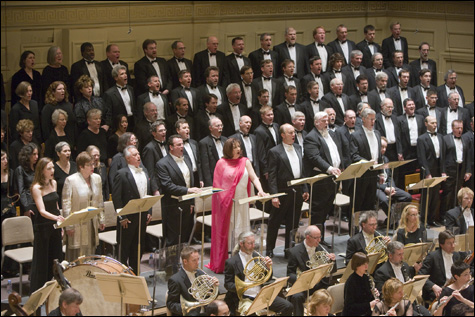
MORE ORATORIO THAN OPERA So James Levine decided to program Les Troyens in concert,
and the result was overwhelming.
|
I just got home and I’m still shaking. Along with about 2000 other concertgoers, I spent this Sunday afternoon and evening at the Boston Symphony Orchestra’s full performance of Berlioz’s epic Les Troyens — his operatic dramatization of Virgil’s sprawling story of the Trojan War and its aftermath, one part dealing with the fall of Troy, the other with the Trojans at Carthage and centering on the doomed love affair between Aeneas, the surviving Trojan prince, and Dido, the widowed queen of Carthage. Les Troyens is one of the most ambitious undertakings in the history of opera, and it has some of Berlioz’s most adventurous, powerful, and unbelievably gorgeous music. The act four sequence of quintet, septet, and love duet is non-stop musical orgasm (which is what it’s supposed to represent). In 1972, Sarah Caldwell presented the first complete American staging. This was Boston’s first chance to hear it since.
James Levine has led Les Troyens numerous times; that includes two Metropolitan Opera productions, the last of which, in 2003, featured the late Lorraine Hunt Lieberson’s towering Dido and Ben Heppner’s glorious Aeneas. (Their love duet had some of the most sublime singing I’ve ever heard.) But this BSO performance may have been even closer to his heart. He seems to have solved all his problems with the orchestra, which was with him every inch of the way, “the way” encompassing some five hours of music separated by a dinner break. And John Oliver’s Tanglewood Festival Chorus outdid even itself in precision, dramatic responsiveness, and passion. There were separate evenings devoted to each part. But this complete performance was the one the true Berlioz lovers came to be overwhelmed by.
At Levine’s press conference for the 2008–2009 BSO season a week ago Monday, a highlight of which is Verdi’s brooding political opera, Simon Boccanegra, the question came up about opera in concert. We enjoy opera on the radio and on CDs, he replied, so why not in concert, especially if it’s an opera with powerful orchestral scoring rather than a lot of scenic effects or dramatic action you want to see play out. Les Troyens certainly fits that category. Berlioz’s own libretto, borrowing some radiant poetic language from Shakespeare, seems almost more oratorio-like than operatic. (It’s not in “scenes” but in “tableaux.”) Caldwell’s staging was memorable, but the two inadequate Met productions distracted from rather than added to the experience. At a day-long symposium at Harvard, Levine talked about how much more vivid the Trojan Horse of our imagination is than any stage image could be.
In this BSO concert version, the orchestra provided its own Technicolor and Cinemascope. Ominous warnings coiled inexorably around our chests; love music transported us into ecstasies. Strong soloists helped. Last year, French mezzo-soprano Yvonne Naef, eyes glued to her score, seemed to give little more than 10 percent as the tormented Marguerite in Berlioz’s La damnation de Faust. But as Cassandra, and fighting a severe cold, she gave 110 percent — she was gripping, heartfelt, and heroic. (The only signs of illness were her handkerchief and the china mug from which she sipped.) Some of Dido is too big for Swedish mezzo Anne Sofie von Otter, but she sounded better than in Mahler’s Das Lied von der Erde a few weeks ago, and she offered such a full and convincing portrayal, the chancier details played only bit parts. Met tenor Marcello Giordano’s Aeneas was both elegant and powerful, though his loudest high notes tended to lose texture. Dwayne Croft gave Chorebus, Cassandra’s lover, an importance the part’s brevity would seem to preclude.